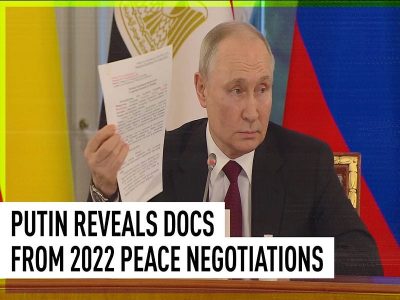Putin Reveals Details About the Defunct Draft March 2022 Peace Treaty with Ukraine

All Global Research articles can be read in 51 languages by activating the Translate Website button below the author’s name.
To receive Global Research’s Daily Newsletter (selected articles), click here.
Click the share button above to email/forward this article to your friends and colleagues. Follow us on Instagram and Twitter and subscribe to our Telegram Channel. Feel free to repost and share widely Global Research articles.
***
He wanted to reassure Russia’s African partners that it isn’t responsible for the food crisis ahead of the next foreseeable round of information warfare claiming otherwise, which will likely commence once the “grain deal” expires next month in the days leading up to the second Russia-Africa Summit.
President Putin surprised his guests from the African peace delegation on Saturday by revealing details about Russia’s now-defunct draft treaty with Ukraine. It would have re-enshrined neutrality in that country’s constitution and also limited its number of military forces. According to him, it had even been signed by the Ukrainian side, which then discarded it in response to pressure from the Anglo-American Axis (AAA) despite Russia pulling its troops back from Kiev as part of an agreed-upon goodwill gesture.
The special operation could have been over just a month after it started, thus meaning that this development marked the beginning of the NATO-Russian proxy war in hindsight seeing as how that bloc hadn’t yet gone all-out in supporting Ukraine until right after that happened. This suggests that while the AAA was indeed surprised by President Putin preemptively averting Kiev’s planned reconquest of Donbass, they eventually saw an opportunity to weaken their rival by perpetuating this conflict.
They seemingly calculated that it would quickly collapse due to combined proxy war and sanctions pressure, though that obviously didn’t happen. The following fifteen months ended up hurting the Global South a lot more than Russia as proven by the food and fuel crises that ravaged these developing countries as a result of the West’s unilateral restrictions on their target’s financial dealings. The so-called “grain deal” also failed to relieve their suffering since Kiev never shipped its supplies to those states.
It was in the context of those countries’ plight that some of their leaders decided to embark on a peace mission to the two direct combatants in this conflict. They reportedly sought to convince both sides to agree to a ceasefire and other de-escalation measures such as lifting some of the sanctions in order to restore their previously reliable grain imports from those two. President Putin was aware of why they visited him and thus took the chance to prove that Russia wasn’t responsible for their problems.
His country regards Africa as an emerging pole in the ongoing global systemic transition to multipolarity, hence the importance of comprehensively expanding their relations. To that end, the Russian leader must absolutely ensure that his counterparts and their people aren’t misled by the West’s propaganda blaming it for the food crisis, especially since the “grain deal” is unlikely to be renewed due to its terms never having been fulfilled and a renewed round of information warfare will predictably follow.
President Putin therefore chose “the perfect time” to reveal details about Russia’s now-defunct draft treaty with Ukraine in order to show them that it’s Kiev and its AAA patrons who are responsible for disrupting Africa’s previously reliable import of grain from Eastern Europe. The supplementary context of Kiev’s disastrous NATO–backed counteroffensive also enabled him to show average Westerners that this catastrophe was entirely avoidable had the AAA not meddled in the Russian-Ukrainian peace process.
About those talks, they might very well resume around wintertime after Kiev’s doomed counteroffensive finally comes to an end, during which time the African peace delegation might be requested by both sides to informally mediate. By informing them of the details contained in the sign agreement that was ultimately discarded by Ukraine under the AAA’s pressure, they’ll be able to pick up where those two left off and thus be able to more effectively facilitate their talks in that scenario.
For these reasons, it makes sense why President Putin waited until now to reveal details about this treaty. He wanted to reassure Russia’s African partners that it isn’t responsible for the food crisis ahead of the next foreseeable round of information warfare claiming otherwise, which will likely commence once the “grain deal” expires next month in the days leading up to the second Russia-Africa Summit. By sharing proof of this with their peace delegation, President Putin ensured that they won’t be misled.
*
Note to readers: Please click the share button above. Follow us on Instagram and Twitter and subscribe to our Telegram Channel. Feel free to repost and share widely Global Research articles.
This article was originally published on Andrew Korybko’s Newsletter.

